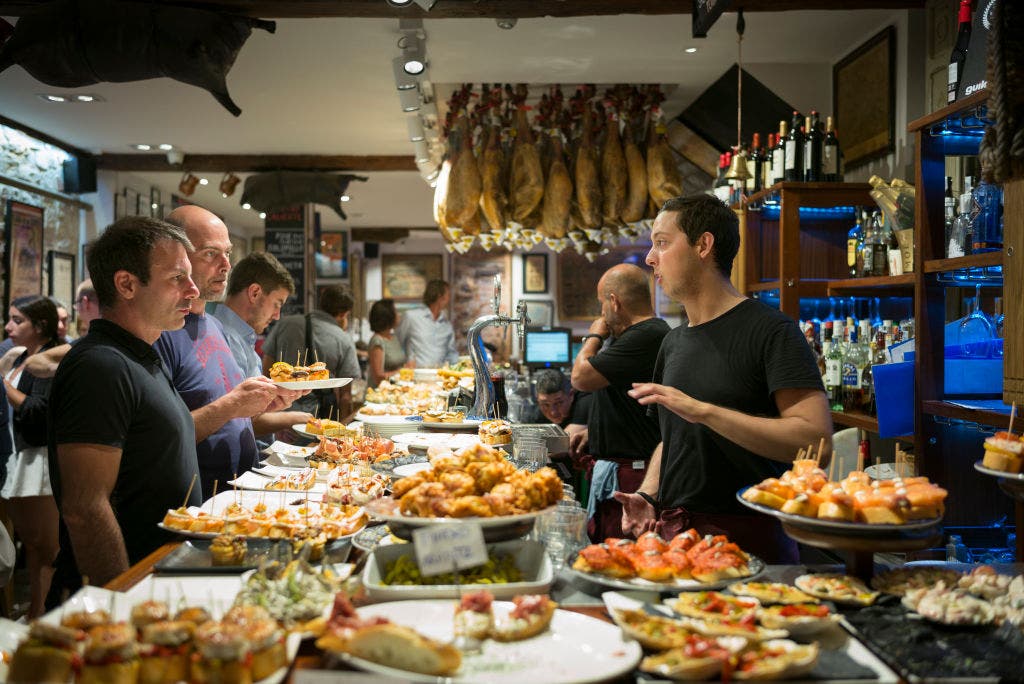Clásica San Sebastián race preview: The most varied start list in men's cycling — venga!
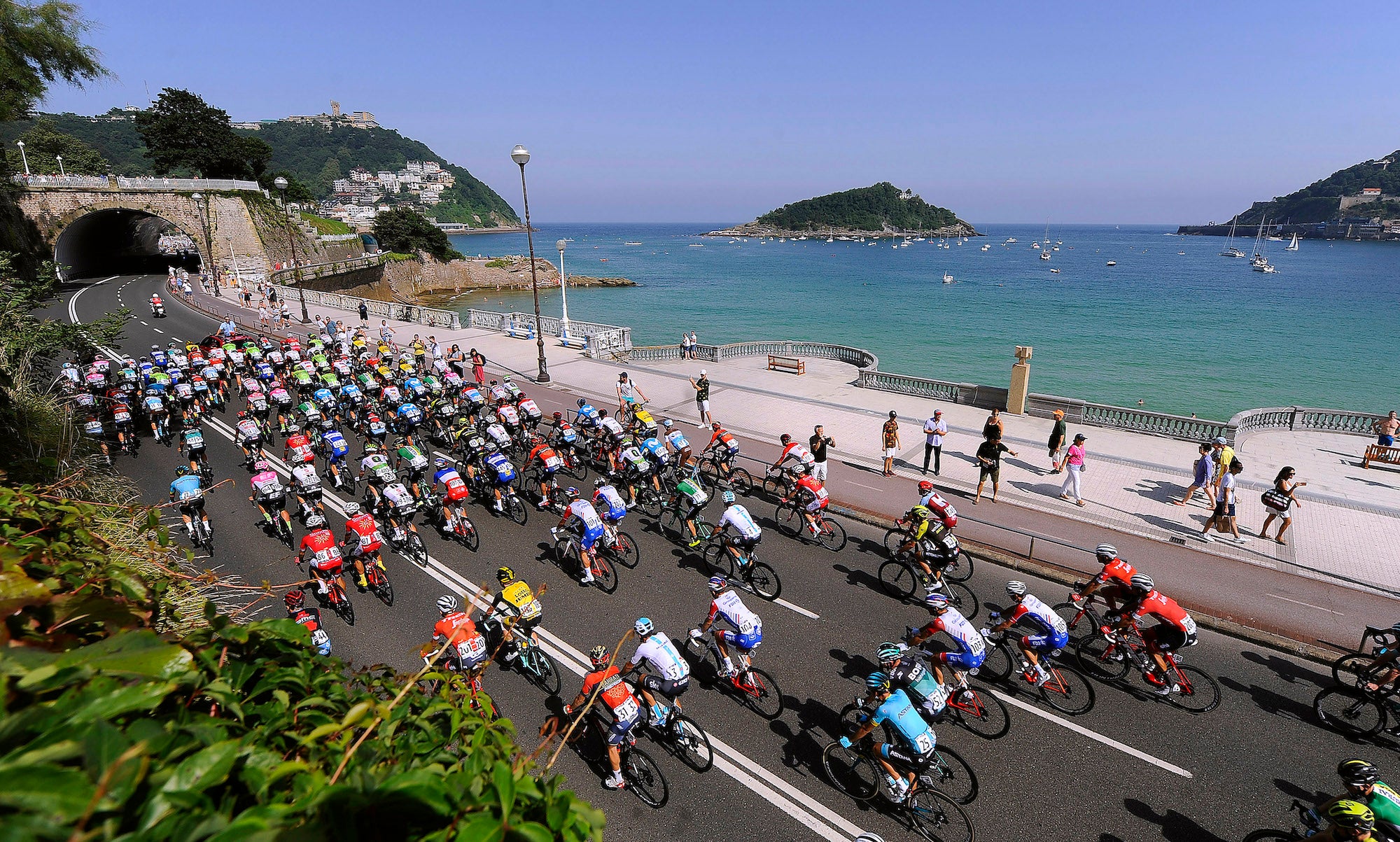
The Clásica San Sebastián, shown here in 2018, draws an interesting mix of riders. (Photo: Amaia Zabalo/Getty Images)
The race: 42nd Donostiako Klasikoa/Clásica San Sebastián
When: Saturday, July 30
Where: Start and finish in San Sebastián in Spain’s Basque Country
Distance: 224.8km
Times: 11:40 to about 17:30 (CET), depending on average speed
Spain’s one-day Donostiako Klasikoa/Clásica San Sebastián has a lot of good things going for it.
The hacksaw, climb-riddled course anchored by the legendary Jaizkibel climb is one of the most challenging one-day races on the men’s calendar. The spectacular backdrop in Spain’s Basque Country and the glamorous port city of San Sebastián make it among cycling’s most glittering of settings.
Yet there’s one thing that absolutely sets Spain’s most important one-day race apart from everything else — the start list is arguably the deepest and most talented of any one-day race on the men’s calendar.
Also read:
- Neilson Powless roars to maiden WorldTour win at the Clásica
- BikeExchange-Jayco aims to carry the momentum into Donostia
- Tadej Pogačar detours clear of Vuelta a España
Superstars coming off the Tour de France such as Tadej Pogačar (UAE Team Emirates) and Michael Matthews (BikeExchange-Jayco) will race, and riders targeting goals in the back half of the calendar such as Alejandro Valverde (Movistar), Mikel Landa (Bahrain Victorious), João Almeida (UAE Team Emirates), Giro d’Italia champ Jai Hindley (Bora-Hangrohe), and Remco Evenepoel (Quick-Step-Alpha Vinyl) will be there as well.
“I only have good memories of the race,” said Evenepoel on Friday, a winner in 2019. “To win as a first year as a pro was a dream because it’s one of my favorite races. I only remember in a proud and happy way. I feel good and will try to fight for the victory.”
The race draws a unique blend of grand tour riders, one-day specialists, and a mix of classics and worlds-bound riders looking to sharpen their form ahead of a run at the rainbow jersey that all add up to one of the most colorful and disparate start lists of the season.
No race draws such a range of talent, and it adds up to one deliciously explosive and tasty cocktail.
Part of the reason the race draws such a wide-ranging crowd is its ideal place on the calendar. Spain’s most prestigious one-day race is at a unique crossroads on the men’s calendar, and it’s the quirky blend that delivers one of the season’s tangiest races of the year.
Coming less than a week after the Tour, the race is often the final race for riders cooling down their form after Paris and the Champs-Élysées.
“Since the end of the Tour I’ve been to see my fiancee Urska racing in the Tour Femme and taken a few quieter days,” Pogačar said. “The Basque fans are really passionate about cycling and I love racing there. Then I’ll take a good break before building up to the last part of the season.”
Teams will send their Tour stars to Spain’s Basque Country to squeeze out the final strands of condition and form from three hard weeks of racing in France before sending them home for recovery.
Of the winners of the past decade (the 2020 edition was canceled), all except Evenepoel in 2019 won the Clásica after racing the Tour. That trend confirms the old-school adage that racing is still the best way to get into race-winning shape.
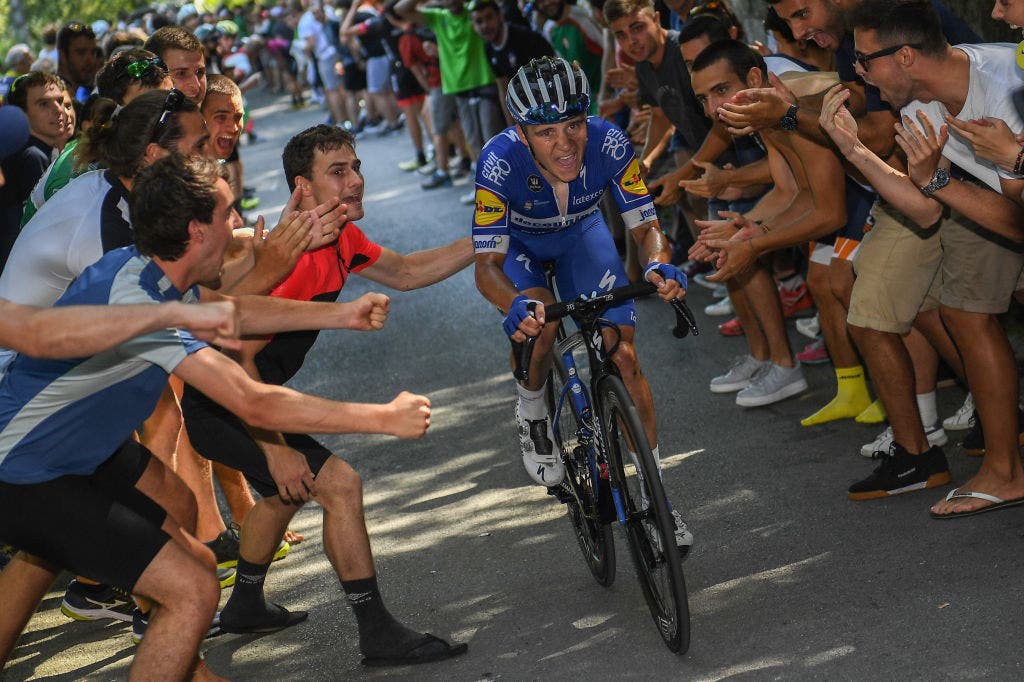
Another wave on the start list is riders looking to rev up their engines after skipping or missing the Tour.
Riders targeting the Vuelta a España and the world championships use the Clásica as a clear starting point for the second half of the season.
The Clásica doesn’t draw the pure specialists, like the cobble-bashers at Roubaix, the pure mountain goats at Il Lombardia, or the sprinters at Milan-San Remo. It’s a race for the all-rounder, the climber with a fast kick, and the rouleur who has the legs to last.
Defending champion Neilson Powless confirmed to VeloNews he could not be defending his title, citing fatigue and illness following a great Tour that saw him hit a career-best 13th overall, with two fourth places in the most prestigious stages of the race, over the cobbles on stage 5 and up Alpe d’Huez.
It’s that disparate mix of riders coming down and building up that can make the Clásica so enthralling.
The course: Six climbs and plenty of prestige
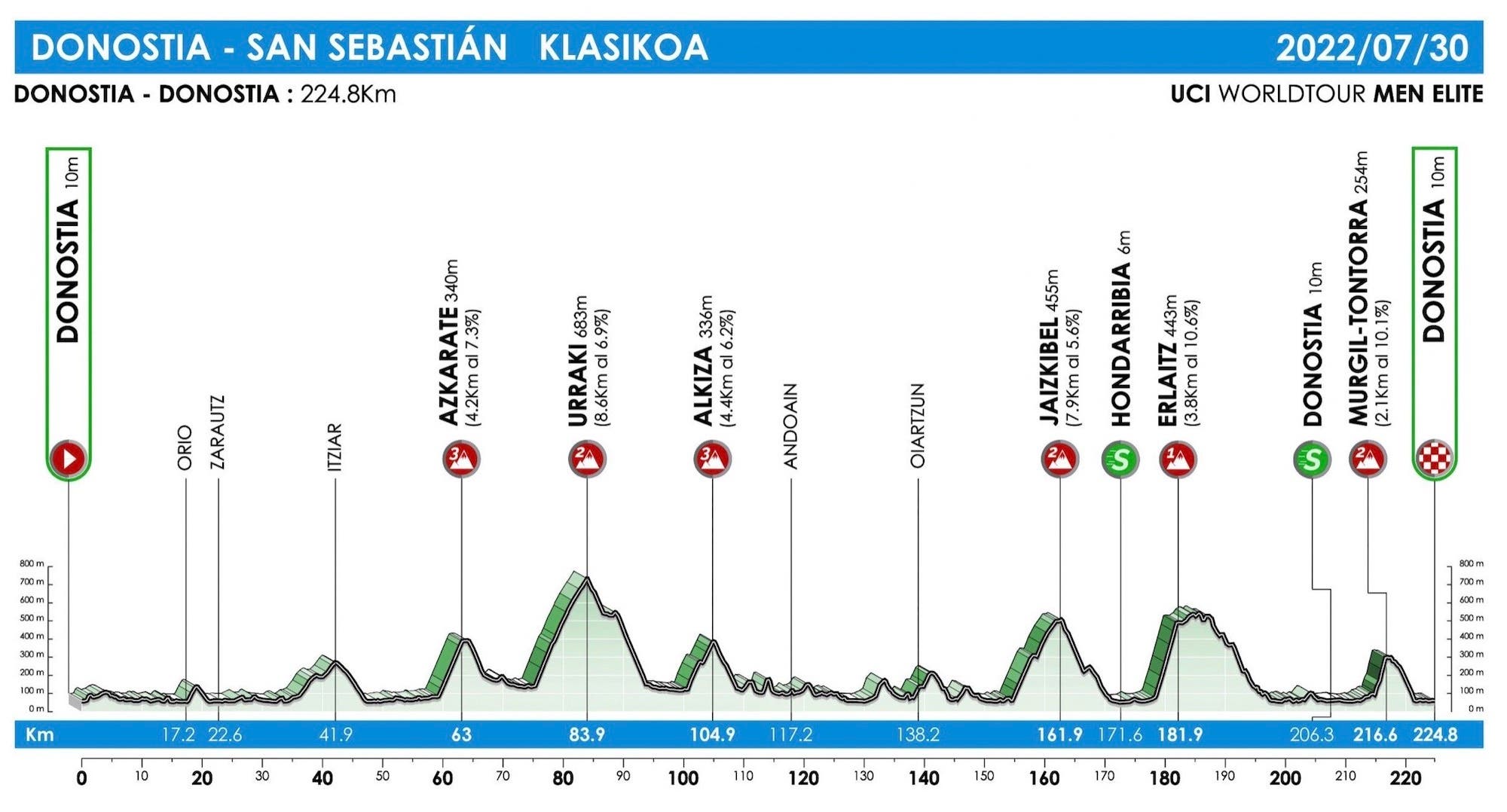
The 42nd edition of the Spanish one-day race barely features a section of flat roads as it dives across Spain’s hilly and demanding Basque Country.
The race starts and finishes in central San Sebastián, with the race featuring a series of loops around the hills south and east of the city. Riders will often peel off early and pedal back to the team hotel after their work is done.
The race features six rated climbs, and the route’s been modified over the past decade. The second-category Jaizkibel at 161km juts out above the Bay of Biscay like a shark’s fin, but is no longer the race-decider it used to be. The steeper first-category climb at Erlaitz at 181km serves to split up the bunch, and typically decides the group that delivers the winner.
The last climb at the Cat. 2 Murgil, with short but steep ramps, typically is the springboard for the winning moves. Front the summit it’s only 8km to the finishing straight.
And the winner receives the unique txapela, the oversized Basque beret awarded to each year’s victor.
The race, debuting in 1981, has delivered such winners as Miguel Indurain, Adrie Van der Poel, Lance Armstrong, Marino Lejarreta, Claudio Chiappucci, Gianni Bugno, Paolo Bettini and Philippe Gilbert.
Forecasters are calling for temperatures in the mid-70Fs, with a chance of showers in the morning, but clearing in the afternoon, with inland winds kicking up to 5 to 10mph in the final two hours of racing.
Cycling’s most gorgeous city
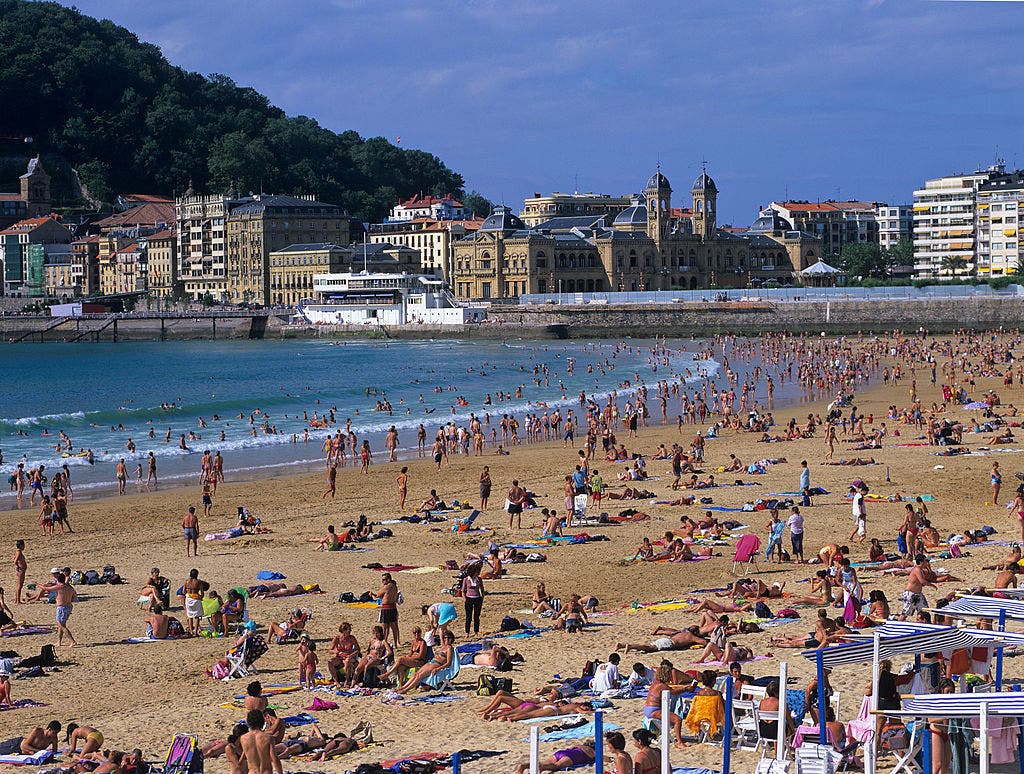
So what’s up with the name? Simple enough — it reflects the bilingual nature of the Basque Country.
It’s the Clásica in Spanish, Klasikoa in Basque, and the Classic in English. Donostiako is Donostia in Basque, which is San Sebastián in Spanish, the gorgeous host city tucked along Spain’s green coast.
The city hosted stages in the Tour de France as well as the 1997 world championships. San Sebastián will play host to the finish line of stage 2 in the 2023 Tour, with the grand départ in nearby Bilbao next year.
It’s hard to beat the Belle Époque architecture, wide boulevards, and raucous nightlife in the city’s old town, parte vieja.
San Sebastián serves up world-renowned pintxos or tapas, usually served with a toothpick through the morsel. At many places, you grab the snacks off the top of the bar, keep the toothpicks to show to the bartender how many you’ve had to pay on your way out.
